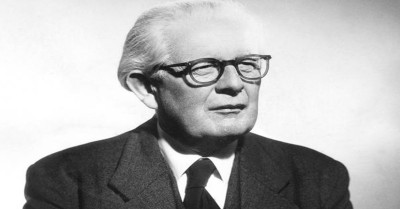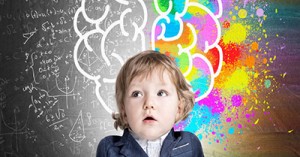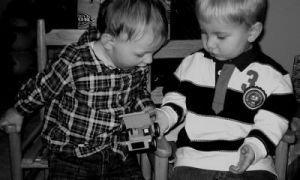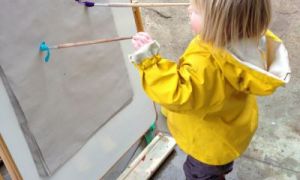Piaget discovered that all children’s cognitive development progressed through four stages, beginning in infancy and are completed by adolescence. Thinking becomes more and more complex as the child ages. Each stage of thinking causes the child to see the world in a different way.
About
Jean Piaget (August 1896 – 16 September 1980) was a Swiss psychologist known for his work on child development. Piaget's theory of cognitive development and epistemological view are together called "genetic epistemology".
Piaget's 4 Stages of Cognitive Development
Piaget proposed four stages of cognitive development which reflect the increasing sophistication of children's thought:
- Sensorimotor stage (birth to age 2) - The main achievement during this stage is Object Permanence - knowing that an object still exists, even if it is hidden. It requires the ability to form a mental representation (i.e., a schema) of the object.
- Preoperational stage (from age 2 to age 7) - During this stage, young children can think about things symbolically. This is the ability to make one thing - a word or an object - stand for something other than itself. Thinking is still egocentric, and the infant has difficulty taking the viewpoint of others.
- Concrete operational stage (from age 7 to age 11) - Piaget considered the concrete stage a major turning point in the child's cognitive development because it marks the beginning of logical or operational thought. This means the child can work things out internally in their head (rather than physically try things out in the real world). Children can conserve number (age 6), mass (age 7), and weight (age 9). Conservation is the understanding that something stays the same in quantity even though its appearance changes.
- Formal operational stage (age 11+ - adolescence and adulthood) - The formal operational stage begins at approximately age eleven and lasts into adulthood. During this time, people develop the ability to think about abstract concepts, and logically test hypotheses.
Paiget indicated that a child must ‘master’ one stage before they can move onto the next stage. Each child goes through the stages in the same order, and child development is determined by biological maturation and interaction with the environment. If they cannot master a stage, they will never reach their full potential. Piaget believed that intellectual development controls every other aspect of development. He believed that there is a pattern to the way children learn to think and this pattern goes in stages.
Piaget’s Theories in Practice
- Educator's nurturance (comfort, teaching, and play) should be suitable for the individual child's stage of thinking.
- We need to develop an understanding of what children can and cannot do based on their age and intellectual ability.
- We should offer tasks that enable a child to achieve and to challenge their skills. If they are given tasks that are too difficult for them, they will not be able to succeed, which may affect them negatively, psychologically and emotionally.
- See children as active learners, listen to their ideas
- Help children find their own answers
- Know that babies will use materials in a different way to toddlers; toddlers differently to preschoolers
- Look for children’s interest and plan to build on them
- Let children repeat an activity, sometimes many times, when we can see that it is still interesting to them
- Children learn in different ways at different ages. Children are little researchers. They learn by using their senses to explore how things work. Piaget says that telling children lots of facts about a thing, without letting them find out about the thing for themselves, is not very helpful. They need to be able to see, touch, taste, smell, move, and hear the things they are learning about. This is called ‘concrete learning’.
References:
McLeod, S. A. (2018, June 06). Jean Piaget's theory of cognitive development. Simply Psychology.
Child Theorists and Their Theories in Practice, Aussie Childcare Network, 03 May 2020







 Toddlers have a greater understanding of the world around them by this stage. Their cognitive development (also known as intellectual development and thinking skills) continues
Toddlers have a greater understanding of the world around them by this stage. Their cognitive development (also known as intellectual development and thinking skills) continues Infants begin to develop trust when parents begin to fulfil their needs. Such as changing an infant's nappy when needed, feeding on request and holding
Infants begin to develop trust when parents begin to fulfil their needs. Such as changing an infant's nappy when needed, feeding on request and holding Beginning at birth the construction of thought processes, such as memory, problem solving, exploration of objects etc, is an important part of an infant’s cognitive
Beginning at birth the construction of thought processes, such as memory, problem solving, exploration of objects etc, is an important part of an infant’s cognitive Toddlers want to do more on their own and do not like it when you begin to establish limits on their behaviour. Tantrums can become
Toddlers want to do more on their own and do not like it when you begin to establish limits on their behaviour. Tantrums can become Your preschooler is now able to focus their attention more accurately and is less influenced by distractions. The intensity of questions increase as your child
Your preschooler is now able to focus their attention more accurately and is less influenced by distractions. The intensity of questions increase as your child John Dewey is often seen as the proponent of learning by doing – rather than learning by passively receiving. He believed that each child was active,
John Dewey is often seen as the proponent of learning by doing – rather than learning by passively receiving. He believed that each child was active, Toddler advance and gains new skills in Gross Motor Development milestones achieved throughout earlier years. Co-ordination and challenges that could not be performed before such
Toddler advance and gains new skills in Gross Motor Development milestones achieved throughout earlier years. Co-ordination and challenges that could not be performed before such Erik Erikson developed a psychosocial theory to understand how we each develop our identities through eight stages of psychosocial development from infancy to adulthood. The
Erik Erikson developed a psychosocial theory to understand how we each develop our identities through eight stages of psychosocial development from infancy to adulthood. The At this point preschoolers begin to interact effectively with others. Play becomes more innovative and organized and “boyfriend” or “girlfriend” begins to emerge. Preschoolers have
At this point preschoolers begin to interact effectively with others. Play becomes more innovative and organized and “boyfriend” or “girlfriend” begins to emerge. Preschoolers have From now, babies begin to identify and respond to their own feelings, understanding other's feelings & needs and interact positively with others. A baby's social and
From now, babies begin to identify and respond to their own feelings, understanding other's feelings & needs and interact positively with others. A baby's social and


